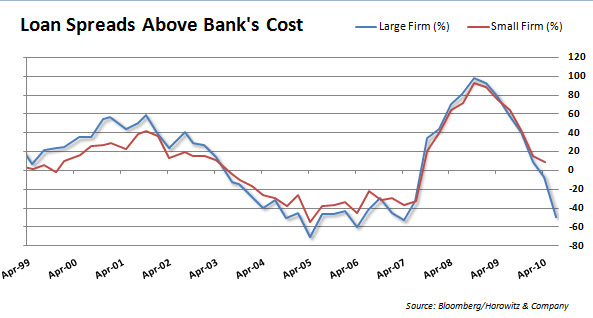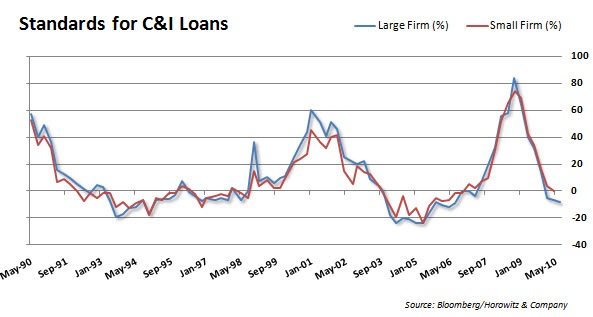A fund manager who will go unnamed mentioned to me that he is putting clients into bank stocks because they are trading at or below book value.
Now of course, individual stocks can and do always outperform the outlook for their sector, so there are no doubt particular banks whose stocks are cheap right now. But there are good reasons to question the notion that banks in general, and money center banks in particular, are a bargain.
First and perhaps most fundamental is the notion that bank equity is a readily-measured number, and that book value is therefore a useful metric. In general, even in companies in make-and-sell businesses, balance sheet items are subject to artful reporting. Notice, for instance, how every four or five years most big public companies take a writeoff that they classify as extraordinary, and equity shills dutifully exclude it from their calculation. In most cases, the writeoff is an admission that past earnings were overstated, but seldom is anyone bothered by what this says about the integrity of that company’s accounting or the acumen of its management.
Bank earnings, even under the best circumstances, involve a great deal of artwork, and most of all in the very big banks with large dealer operations. As Steve Waldman pointed out,
Bank capital cannot be measured. Think about that until you really get it. “Large complex financial institutions” report leverage ratios and “tier one” capital and all kinds of aromatic stuff. But those numbers are meaningless. For any large complex financial institution levered at the House-proposed limit of 15×, a reasonable confidence interval surrounding its estimate of bank capital would be greater than 100% of the reported value. In English, we cannot distinguish “well capitalized” from insolvent banks, even in good times, and regardless of their formal statements.
Lehman is a case-in-point. On September 10, 2008, Lehman reported 11% “tier one” capital and very conservative “net leverage“. On September 25 15, 2008, Lehman declared bankruptcy. Despite reported shareholder’s equity of $28.4B just prior to the bankruptcy, the net worth of the holding company in liquidation is estimated to be anywhere from negative $20B to $130B, implying a swing in value of between $50B and $160B. That is shocking. For an industrial firm, one expects liquidation value to be much less than “going concern” value, because fixed capital intended for a particular production process cannot easily be repurposed and has to be taken apart and sold for scrap. But the assets of a financial holding company are business units and financial positions, which can be sold if they are have value. Yes, liquidation hits intangible “franchise” value and reputation, but those assets are mostly excluded from bank balance sheets, and they are certainly excluded from “tier one” capital calculations. The orderly liquidation of a well-capitalized financial holding company ought to yield something close to tangible net worth, which for Lehman would have been about $24B.
So Lehman misreported its net worth, right? Not according to the law. From the Valukas Report, Section III.A.2: Valuation — Executive Summary:
The Examiner did not find sufficient evidence to support a colorable claim for breach of fiduciary duty in connection with any of Lehman’s valuations. In particular, in the third quarter of 2008 there is evidence that certain executives felt pressure to not take all of the write‐downs on real estate positions that they determined were appropriate; there is some evidence that the pressure actually resulted in unreasonable marks. But, as the evidence is in conflict, the Examiner determines that there is insufficient evidence to support a colorable claim that Lehman’s senior management imposed arbitrary limits on write‐downs of real estate positions during that quarter.
In other words, the definitive legal account of the Lehman bankruptcy has concluded that while executives may have shaded things a bit, from the perspective of what is actionable within the law, Lehman’s valuations were legally indistinguishable from accurate. Yet, the estimate of net worth computed from these valuations turned out to be off by 200% or more.
Yves here. Aside from the general issues Steve raises, we have specific reasons to be skeptical of bank asset valuations right now. It isn’t merely that we have very low interest rates, which do a wonderful job of juicing the value of risky and long-dated financial assets. More important, there is ample evidence of regulatory forbearance, more colloquially called “extend and pretend.” We’ve pointed repeatedly to evidence of how the four biggest banks are carrying large portfolios of second mortgages at implausible valuations. Similarly, risky assets are also being carried at marks well in excess of their likely long term value. As one reader noted late in the spring:
….the same money managers that bought new issue subordinate CMBS tranches at $100.00 and sold them at $30.00 are now buying them back after the “wall of money”, bubble momo has pushed their prices back to $90.00. Of course the fundamentals of CRE are still god-awful, the loans are defaulting in droves, and the eventual “value” of many of those bonds is very likely to be $5.00.
Yves here. Another issue is the impact of financial reform. Even though yours truly thinks it is underwhelming, the changes in progress will reduce bank leverage somewhat. Less leverage means lower returns on equity.
Andrew Horowitz of The Disciplined Investor sent some charts via e-mail that provide further support for bank skeptics. The first chart points to a sharp compression in loan spreads. This is similar to, albeit less extreme, than what has taken place in Japan, where banks are so flush with cash that the competition for loans means they cannot earn an adequate spread.

Another symptom of excessive competition for loans in the sectors where banks are willing to lend is deteriorating lending standards for bread and butter commercial and industrial loans:

Even though it’s fashionable for bankers to blame their so-so equity performance on the government that bailed them out, the big culprit is that financial sector will contract regardless as households and companies deleverage, plus a crappy economy means not so hot business prospects.


Bank stocks are based on nothing real, just the cons enumerated here – de facto legalization of fraud via “forbearance” and simple refusal on the part of regulators to do their jobs (the former is the same thing as the latter, just dressed up in false dignity as a formal policy); de jure legalization of fraud via all the rule changes which allow extend and pretend and other forms of mark-to-make believe. Also how fraudulent accounting is allowed to result in fraudulent reportage of “profits”, which in turn legalistically enables fraudulent conveyance in the form of these “bonuses”.
Every cent of this is stolen, plain and simple.
Even though it’s fashionable for bankers to blame their so-so equity performance on the government that bailed them out, the big culprit is that financial sector will contract regardless as households and companies deleverage, plus a crappy economy means not so hot business prospects.
In the same vein, as I read the piece I was picturing all the swinish John Galt types who trade these stocks, calling and often thinking themselves brilliant “wealth producers”, when in reality they and the stocks are pure parasites on government welfare. Pure thieves, and such average, meager, ugly, shallow, boring, paltry ones, too.
Part of the great benefit of ending and restituting the Bailout will be the purging of this leech.
Fund Managers use the term “conviction” alot these days, especially where there continues to be such a great amount of uncertainty on both the top down ( de-in-stag-flation) and, bottom up ( financials tend to be more leveraged capital market bets). However, conviction is a 10 LETTER word.
FEES – is a 4 LETTER word that they generate for ugly performance of late and, at least over the last three years annualized and, marginal performance on a 5 year annualized basis!
Most equity fund managers are either flat or losing money for their clients year to date. Worse, on an annualized 3 year basis the returns are single digit NEGATIVE performance for a FEE ( make it a 3 LETTER word). 5 year annualized performance tends to look marginally better ( mid single digit returns) but, in point of fact, the retail investor seldom holds a mutual fund for a 5 year period of time with the level of volitility we have had in the past.
BANKS as attractive stocks?? It is great for those that are employed there ( compensation and carrer-wise once you have made enough you can step out). But, for retail investors, it has proved to be a losing proposition, time and time again.
Valukas might have written a good report. But as far as I have followed things he did not get close to LEH´s derivative book.
Also the LEH bankruptcy lawyers explicitly claimed not to understand derivatives and hired two (2!!!) subcontractors to sort out all LEH derivatives. This smells fishy to me. 150 bn vanish and all accounting was white & grey ? No way. There were some black holes at LEH. Must be a political issue for any regulator or DA not to come to close to these holes.
If anybody can substract plausibly from + 24 to – 150 equity on a 600 bn balance sheet (and some derivative fog), I am willing to listen and concede legality.
Only a fool would have any faith in the banks, their regulators, or economists.
If the government announced that it was closing down the FDIC there would be a run on mattress covers!
I haven’t read all of the Valukas report. What I have read suggests to me that there is a criminal case imbeded in the fact of Lehman’s bankruptcy. Repo105 would be my starting point as I see that little bit of ledgerdemain as being the institutional sin that had to have been empowered by a human being or beings.
As to buying banks now. There are other better and fairer opportunities available. So long as the banks continue to hold questionable paper and questionable prices, the reported net asset values are a fiction. That’s novel you’ll not profit from its reading.
…and who is the biggest banker of ‘US’ all… with the profound ability to both “create” money while at the same time “destroying” it…
A view from Europe: S&P just came out recently with the figure that the total liabilities of European banks amounts to EUR 300 trillion and that refinancing needs are estimated between 1,5 and 2 trillions before the end of 2012, including or not according to the different estimates, the EUR 500 billion they have to repay to their governments.
‘Ireland: A recession by the banks, from the banks and for the banks’
http://fistfulofeuros.net/afoe/economics-country-briefings/ireland-a-recession-of-the-banks-by-the-banks-and-for-the-banks/
Hello administrator I be happy along with your article . might i copy this know-how being my educate verify ? thanks
Banks currently borrow money from the Fed at approximately 0% and lend it back to the Treasury at more than 0%. Therefore they are coining money. Therefore they are profitable.
However, whether they are worth investing in depends on whether they will ever give any of that money to the shareholders. The evidence is no. They will pay it out to the executives in “bonuses”. They may issue small dividends, but not enough to cover the loss in stock value when they go bust.
The evidence is that becoming a bank executive is a very profitable investment choice. It also appears to require no actual intellect or work, merely a lack of conscience. Where can I sign up?